March 22 - 28, 2015: Issue 207
WARRINGAH AND MACKELLAR FEDERAL ELECTORATES ANZAC CENTENARY COMMEMORATION
The Warringah and Mackellar Federal Electorates’ Commemoration is in cooperation with the Davidson, Manly, Pittwater and Wakehurst State Electorates; the Manly, Mosman, Pittwater and Warringah Councils together with ex-service groups including the RSL, Vietnam Veterans and National Service organisations. All schools, sporting, community and Community and Emergency Service organisations in the two electorates have been invited to participate, along with an estimated 2,500 current and ex-service members of the Defence Forces.
This Centenary Commemoration will be the major community event for the two electorates. Any organisation who may have inadvertently not been invited to march is requested to contact Graham Sloper at the Avalon Beach RSL Club (9883 9814 or 9918 2201)
The ceremony will be held on Sunday 19th April 2015 with a march from Boondah Reserve, Warriewood at 11.00 am and finishing at Pittwater Rugby Park for a Commemorative Service. The Service will conclude no later than 12.30 pm. A Warringah Shute Shield rugby match will follow the Service.
The day will commence with a rehearsal at 9.00 am in Pittwater Rugby Park for the massed school bands and choirs which have been included in the program to give greater involvement exposure for our youth.
Over 5,000 have committed to the march. All groups may carry their own banners if they wish and will be identified by the Master of Ceremonies as they march past the VIP stand on Rugby Park. Some 20,000 are anticipated to attend the Commemoration Service where the address will be given and prayers for the Services and the Fallen read.
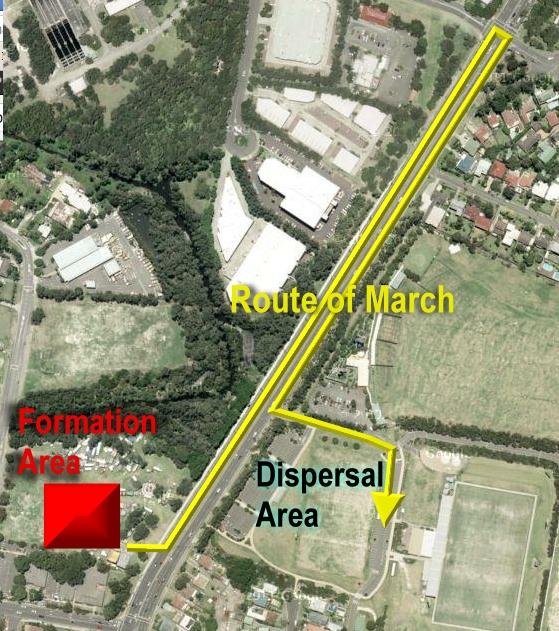
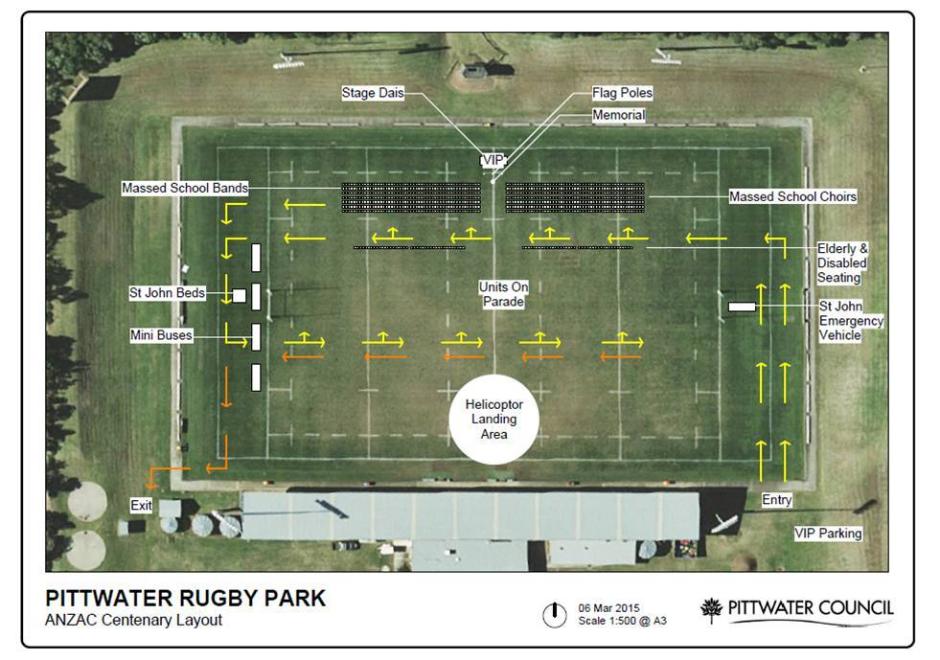

Anzac Day 2015
100 Years 100 Boats Anzac Beach Memorial
South Curl Curl Surf Life Saving club has partnered with Turkish household appliance giant beko to help commemorate the 100 years since the Gallipoli landings. Plans are underway to have 100 surfboats simulate the Gallipoli landings at Collaroy Beach on ANZAC Day 2015.
This commemorative event will be held at approx 12:15pm, aligning with the Dawn Service at Gallipoli. Large LCD screens will televise the “live” Gallipoli Dawn Service in advance of our simulated landing and wreath laying ceremony.
Surf Boat crews are invited to participate in this event by registering their interest on our website.
To date registrations have been received from Australia, New Zealand, Turkey, Germany, and Singapore.
Education of our youth is an important part of this commemorative event. The organizers will be working with 100 schools across Turkey, New Zealand and Australia to have wreaths made by students. During the ceremony a representative from each of the schools will present their wreath to a member of each of the 100 surf boat crews. Crews will then return to sea, raise their oars and present the wreaths to the depths.
Prior to the ANZAC Ceremony, students will be offered the opportunity to undertake simple research projects about what ANZAC means to them, not only from an Australian/New Zealand perspective, but also from a Turkish perspective. These research projects will be displayed on the day and published on the event's website.
The Gallipoli campaign is often referred to as the moment that Australia and New Zealand came of age. This same campaign set in motion events that later saw the Turkish commander, Mustafa Kemal Ataturk go on to become the first President of Turkey, and was credited as being the founder of the Republic of Turkey. Gallipoli in effect was the birth of these three great nations, and the start of an ongoing friendship that endures to this day. Our ceremony aims to commemorate the sacrifices of all the combatants on the Gallipoli peninsula all those short years ago.
As a thank you to the participating schools, the organizers have sourced one hundred pine saplings that are actual genetic descendants from the pine trees destroyed during the battle of ‘Lone Pine’ at Gallipoli back in July 1915. These saplings will be presented to a representative from each participating school to take back to their schools to plant as a memento of this significant day.
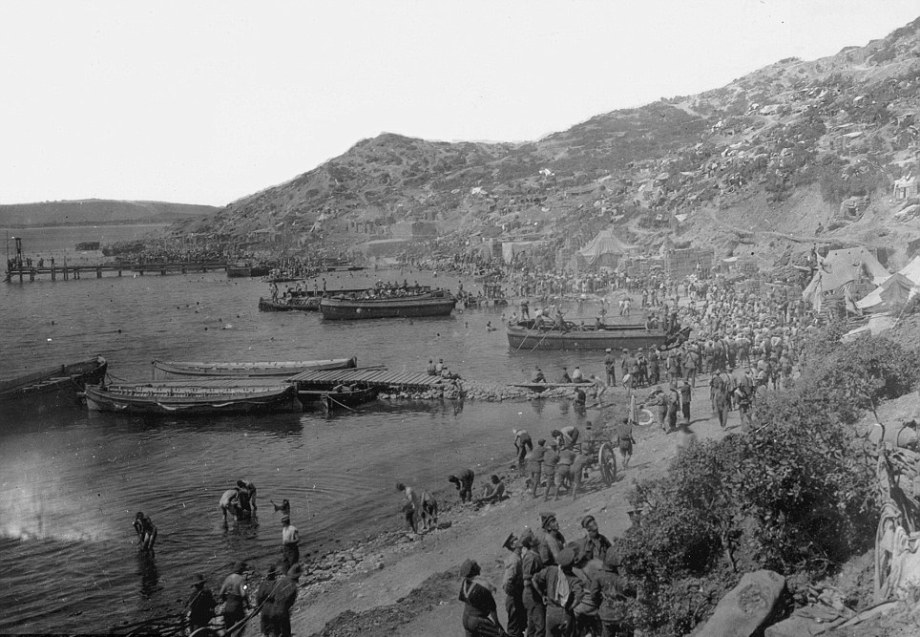
Anzac Cove - 1915
Many Surf Life Saving clubs have members that served their country during what was to be the ‘War to end all wars’, many of whom did not return. Clubs are encouraged to research their history and remember them by including names on their boats, or including a small plaque to be used in the ceremony.
Guest speakers are expected to include the Right Honorable Mike Baird, Premier of New South Wales, Michael Regan, Lord Mayor of Warringah, and other dignitaries.
Those participants, or members of the community wishing to wear their, or their ancestor’s medals are most welcome to do so for this event
“We are honoured to be part of this historic Anzac Day commemoration,” says Michael Goadby, CEO of beko Australia & New Zealand.
"As the Club's representative for this community event we are fortunate to have such a relevant partner in beko and to be supported by Warringah Shire Council, New South Wales Government, Collaroy SLSC and the Collaroy RSL Sub-Branch" says Bryn Russell, Life Member of South Curl Curl Surf Life Saving Club.
For further information please click here . Clubs are invited to register to participate in this once in a generation event via Anzac Beach Memorial Event phone number: 0432 849 944 Email: 100year100boats@gmail.com
______________________________
On April 25th 1915 Corporal Val Marshall 4th Battalion AIF, made a sketch of what he described as showing countryside….”not unlike parts of the Sydney coastline near Curl Curl and North of Narrabeen”
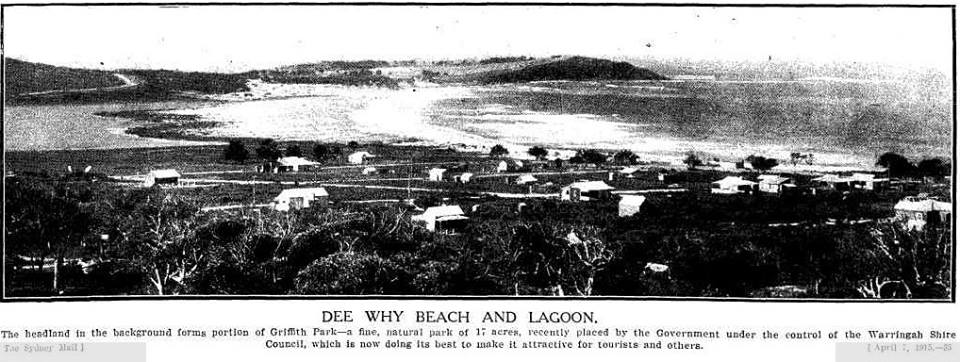
Above: DEE WHY BEACH AND LAGOON. The headland in the background forms portion of Griffith Park— a fine, natural park of 17 acres, recently placed by the Government under the control of the Warringah Shire Council, which is now doing its best to make it attractive for tourists and others. THE BEAUTIFUL SHIRE OF WARRINGAH. (1915, April 7).Sydney Mail (NSW : 1912 - 1938), p. 34. Retrieved from http://nla.gov.au/nla.news-article166255867
Pittwater RSL - 2015

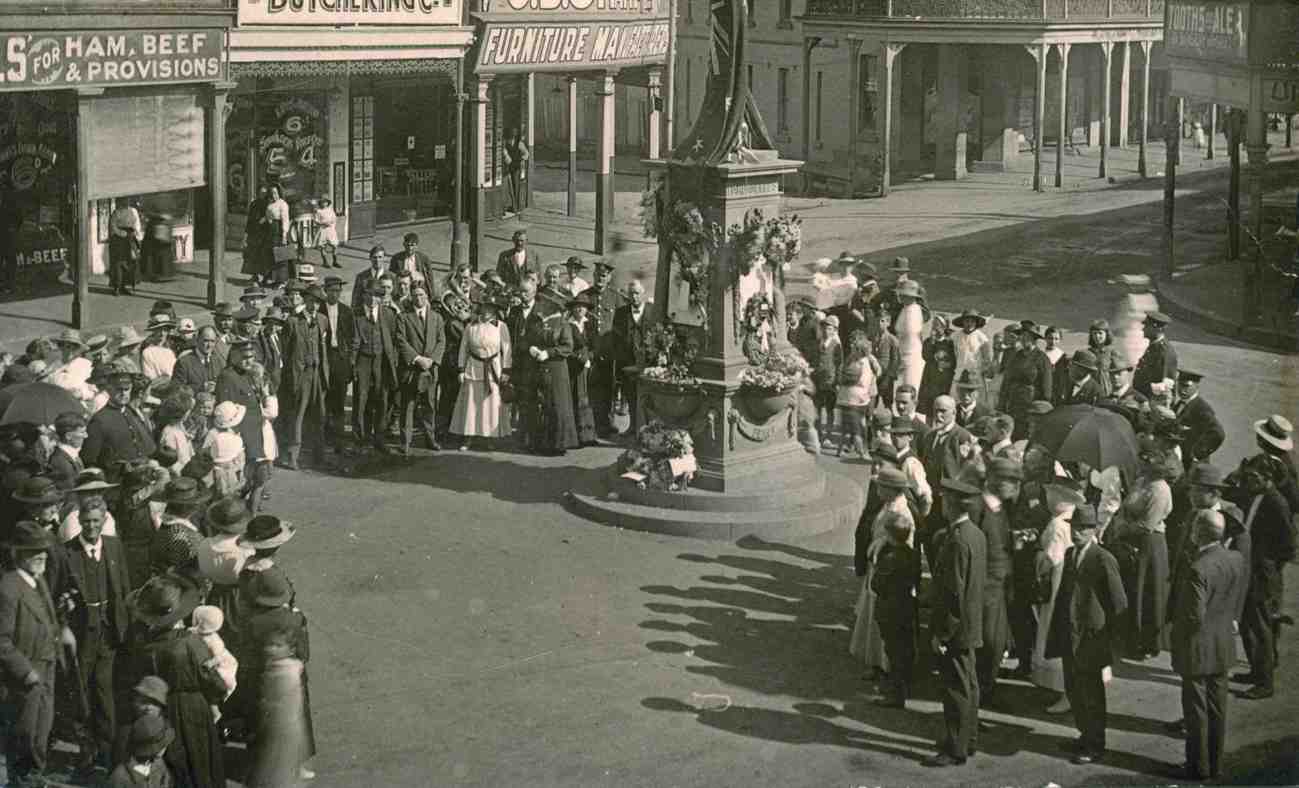
Above: Rememberance Day -Loyalty Square Balmain - 1916 WWI: Erected during WW1, Balmain’s Unity Square was renamed Loyalty Square at a ceremony on April 24, 1916. The memorial drinking fountain, featuring the words ‘Peace, Honour, Empire, Liberty’ recorded the names of 38 Balmain men who lost their lives at Gallipoli. Photographer: Unknown, Date: Unknown, courtesy Leichhardt Council
The first ANZAC Commemorations
During the past few months we have been including the names and found notes on many a Pittwater resident who came home after World War One. There are far more than we could run whole pages on. There isn't one suburb that did not send several and in some cases, post WWI, most of the men people may have been surrounded by had served if young and fit before enlistment.
Our recent History pages, although celebrating wonderful people or restaurants you could also stay in, have also illustrated those here, after this war, were surrounded by returned service people who may have noticed how quiet and peaceful our area is, and was then, after where they had been and what they had seen. This week's Pasadena page is no exception, nor was Barrenjoey House, a place Carl Gow frequented, or the the relatives of Pittwater's original matriarchs, Sarah A. Biddy Lewis and Martha Catherine Bens
As we head towards Easter Sunday 2015, a time each year when the triumph of life over death is celebrated, and towards ANZAC Day 2015, 100 years after Gallipoli, it seems timely to wonder what our ancestors may have been experiencing, thinking, or speaking of during that first Easter after Gallipoli.
The Easter of 1915 fell just 23 days before so many Australians and their New Zealand mates fell on the beach and slopes of that faraway landing place.
The Easter of 1916, in particular Easter Sunday, fell on April 23rd, two days before that horrendous day. A few notes from the periodicals of then and the first commemorations:
NEWS.AND NOTES. Anzac- Day. A movement is being inaugurated in London to celebrate the anniversary of the Australian and New Zealand landing at Anzac (25th April) simultaneously in Great Britain with that in Australia. Owing to the State schools being closed on 26th April (Easter week), Anzac Day will be observed in Victoria on 20th April. NEWS AND NOTES. (1916, March 27). Swan Hill Guardian and Lake Boga Advocate (Vic. : 1914 - 1918), p. 4. Retrieved from http://nla.gov.au/nla.news-article92121473
ANZAC DAY. TO THE EDITOR OF THE ARGUS.
Sir,-Referring to the letter by Mr. J. Merriman yesterday, I would like to state that arrangements are in hand in regard to a procession of as many soldiers as possible who took part in the landing at Gallipoli proceed through the city on "Anzac Day," which, owing to the Easter holidays, will be celebrated on April 28.-Yours. 4c.. -FRANCES M. WOOLCOTT, Hon. Sec. Commonwealth Button Fund.March 31. ANZAC DAY. (1916, April 3). The Argus (Melbourne, Vic. : 1848 - 1957), p. 8. Retrieved from http://nla.gov.au/nla.news-article2106686
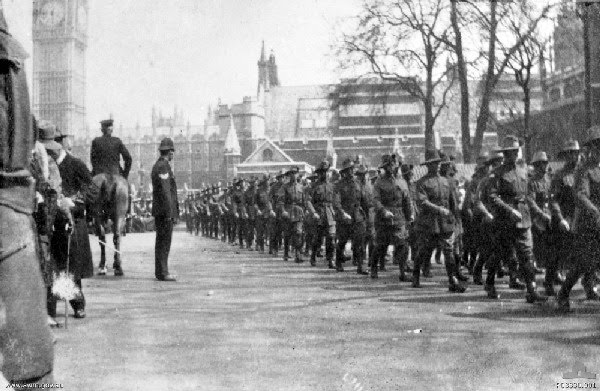
Australian 1st Division troops marched through the London streets on the anniversary of the first Anzac Day. Big Ben and The Houses of Parliament can be seen in the left background (AWM P03330.001)
Westminster Abbey commemoration service brochure (Souvenirs 13/2/2) courtesy Australian War Memorial
ANZAC DAY IN ENGLAND SERVICE IN THE ABBEY. HONORED BY THE NATION.
LONDON, April 25.
The great event which has been written deep in Australian history under the date of April 25 was celebrated by a religious ceremony in Westminster Abbey, that venerable building, which has been closely associated with every great national incident since the Norman William was crowned there. Its vaulted roofs have witnessed State funerals, public thanksgivings, and Royal coronations, besides the routine of daily services for 800 years, and today it was the scene of a great religious service which will touch the further fibres of the Empire.
The first anniversary of the landing of the Australians and New Zealanders on Gallipoli Peninsula was devoted to honoring the memory of those heroes who fell in the campaign. Thus was opened a new and wonderful chapter in the Australian record. The Gallipoli fighting was so full of stirring and tragic incidents, that for days there have been signs of a popular desire to pay tribute to those who gave their lives in the Empire's service. Another incentive was the prospect of seeing many of the actual heroes who have returned from the land of death and slaughter. Nearly 2,000 Australians and New Zealanders participated in the service.
Our Maimed Heroes.
Many are convalescents, and some have quite recovered from their ailments. Not a few were engaged in the hottest phases of the Gallipoli inferno. One can understand somewhat their feelings at hearing in Britain's historic shrine the names of the brigades which took part in the great conflict. Of those men present, over 500 were drawn from Montevideo Hospital, 400 from Abbeywood, 200 from Horneferry-road, and 300 from such hospitals as Harefield. The New Zealanders, under Major Dawson, detrained at the Temple station, and paraded on the Thames Embankment. The Australians, under Lieutenant-Colonel Johnstone, who was present at the landing, and a battalion belonging to Abbeywood and Montevideo, arrived at Waterloo station, and marched across Waterloo Bridge, to combine with the New Zealanders in the Kingsway.
In the Great Minster's Transepts.
The procession marched along the Strand to Whitehall, and down that historic thoroughfare past the War Office to Westminster Abbey. Many Anglo-Australians were accommodated at the windows and on the roofs of the Victoria, Queensland, Western Australian, and New Zealand Government Offices. Sir Thomas MacKenzie and his staff have already moved to the New Zealand offices in the Strand. The arrangements in Westminster Abbey were very complete. Massed bands and 600 fit men of the Australian contingent entered by the north door, and were accommodated in the north transept amid the memorials of the foremost politicians, judges, and statesmen of England. The statues of Pitt, Canning, Gladstone, and Disraeli, timorous builders of the wider Empire, looked down on men whose heroism has given cohesion and unity to the work of Imperial statesmen. The New Zealanders entered the Abbey by the door in "Poets' Corner," and occupied seats in the south transept. They found themselves among the memorials of the most noted men of England. On every hand are reminders of those whose writings stirred the imagination and the patriotism of the race from Geoffrey Chaucer to Charles Dickens. It is specially appropriate that this is Shakespeare week. The well-known figure of the great poet there stands in a place of prominence, with his memorable inscription, which reminds us of the "Wreck of Empires" and the dissolution of "The great globe itself and all which it inherit." The remainder of the Australian troops, of whom not a few walked with the aid of crutches or sticks, and assisted by nurses, assembled at the Horseferry-road depot, and were driven to the Abbey. They entered by the western portal, and were accommodated in the choir.
Literary Prominence.
The English newspapers on Monday and today contained many descriptive tributes to the imperishable record of the Australasian and New Zealand soldiers at Gallipoli. This morning the leading news-papers publish special articles giving prominence to the anniversary. ANZAC DAY IN ENGLAND. (1916, April 26). The Advertiser(Adelaide, SA : 1889 - 1931), p. 7. Retrieved from http://nla.gov.au/nla.news-article8716229
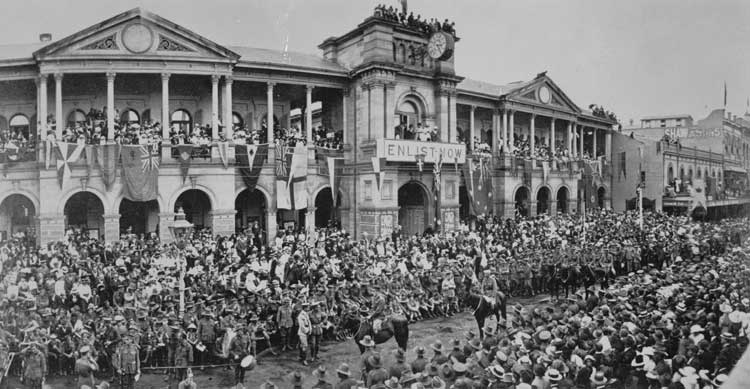
By April 1916, Australian troops were already fighting in the trenches on the Western Front, and were to remain there for at least another gruelling two years.
IN FRANCE. AUSTRALIANS IN TRENCHES NEW METHODS. COMPARISON WITH GALLIPOLI.
(BY CAPTAIN BEAN, AUSTRALIAN PRESS REPRESENTATIVE.)
BRITISH HEADQUARTERS, FRANCE, April 25.
The cottage door is open to the night. The soft air of a beautiful evening following on a glorious day brushes past one Into the room. As I stand here the nightingale from a neighbouring garden Is piping his long exquisite repeated note till the air seems full of It. Far over the horizon Is an Incessant flicker like summer lightning, very faint, but quite continuous. Under the nightingale’s note comes always a dull grumble, throbbing and bumping occasionally, but seldom quite ceasing. Someone Is getting it heavily down there-It is not our Australians.
It was just such a glorious day as this one has been one year ago, when this corps of untried soldiers suddenly rushed Into the nightmare of a desperate fight. At this moment of the night the rattle of rifle fire was incessant all round the hills. Men wore digging and firing, and digging in a dream which had continued since early dawn, and had to continuo for two more days without chance of rest. They were old soldiers within 24hours, as their leader told them In an order which was circulated at the time. Only a sprinkling of the men who were there are in the Anzac units to-day. But they are the officers and the N.C.O's., and that means a great deal.
There is much that is different from Gallipoli. The rain has been heavier In March than for 35 years, and April, until yesterday, seemed almost as bad. The trenches are made passable by being floored with a wooden pathway, which runs on piles-underneath which runs the gutter of water and mud, which Is the real floor of the trench. Sometimes the water rises in the communication trenches so that the boards float on and disappear. To step into an interval between them you may quite well sink in to your waist in thin clay mud. The actual firing trenches and the dugouts there are mostly dry by comparison, except where the accumulated task of draining has been gaining on some regiment which has been holding them. At the rear of the line is a morass of foul-smelling clay.
This difficulty never really reached us In Gallipoli, though we might possibly have found the trenches falling in upon us in the rains of winter if we had stayed. The trenches in France are full of the traces of old dugouts, and mouldering sandbags, before the timbering of all workings was looked on an n necessity. In Anzac we never had the timber for all this, and I doubt If we could ever have had It had we stayed. The soil there was dry, and held up well, and the trenches were deep and very elaborate to a degree which one has not seen approached in France. There may be some parts in the lines where such trenches are possible and where they exist, but I have not seen them. It must be remembered that in France there are stretches of line where it is impossible to dig a trench at all In winter, because you meet water as soon as you scratch the surface, and, therefore, both our line and the Gorman's are a breastwork built up Instead of a trench dug out. The curious thing is that in the trenches themselves you scarcely realise the difference. Your outlook there is bounded in either case by two muddy walls, over which you cannot wisely put your head in the daylight. The solace may be a glorious green field, with flowers and birds, and little reedy pools. If you are two feet over the parapet; but you see nothing from week-end to week-end except two muddy walls and the damp, dark interior of a small dugout. You see no more of the country than you would In a city street. Trench life is always a city life.
SNIPERS WITH A FIELD GUN.
The trench is the same as it was in Gallipoli except that in any part where I have been the tension is nothing like so great. It Is not as though you were hanging on to the edge of a valley by your fingernails, and had to steal every yard that you could In order to have room to build up a second line, and If possible a third line beyond that. Here both you and the enemy have scores of miles behind you, and two or three hundred yards more or less makes no difference worth mentioning.
For this reason you would almost say that the German line in this country was asleep compared with the lines we used to know. A hundred and fifty yards of green grass, with the skeleton that was once some old hay waggon upended in the middle of it, and sky- blue water showing up through the grass blades in the depressions; a brown mud wall straggling along the other side of the green - more or less parallel to your breastwork, with white sandbags crowning it like an irregular coping; the inevitable stumpy stakes and masses of rusted barbed wire in front. You might watch it for an hour, and then the only sign of life you would see would be the blue whiff of smoke from some black tin chimney stuck up behind it. The other day chancing to look into a trench periscope, I happened for a moment to see the top of a dark object moving along half-hidden by the opposing parapet. Some earth was being thrown up over the breastwork Just there, and probably the man had to step round the work which was going on. It was the first and only time I have seen a German In his own lines.
The German here really does his sniping much more with his field gun than with his rifle. They do use the rifles, and they are good shots, but slow. A spout of dust on the parapet, and a periscope has been shattered in. They snipe us at times with their field-guns and mountain guns at certain fixed places, shooting at any small body of men behind the lines. Half a dozen are quite enough if they see them.
The German gives you the impression of being a keener observer than the Turk. The hill and trees behind his lines are really within view of you over miles of your own country though you scarcely realise it at first, and they are full of eyes- Also every fine day brings out his balloons like fat grubs-and our own. In Gallipoli our ships had the only balloons-the Turks had all the hilltops.
THE GREAT DIFFERENCE.
The aeroplane here affords so big a part of the hourly spectacle of warfare, and makes so great a difference In the obvious conditions of the fight, that he deserves an article to himself. But of all the differences, by far the greater is that our troops here have a beautiful country and a civilized, enlightened population at the back of them, which they are defending against the Invading enemy whom they have always hoped to meet. They are amongst a people like their own, living in villages and cottages and paddocks not so different from those of their own childhood. Right up into the very zone of the trenches there are houses still inhabited by their owners.
In Gallipoli there were brigade headquarters in the actual fire trenches. From the actual headquarters of the division of the corps you could reach the line in 10 minutes' hard walking at any time. It Is a Sabbath day's Journey here-the only possible way of covering the longer distances regularly Is by motor car or a motor cycle, and no one dreams of using any other means-Indeed, no other exists. Nearly the whole of the army, except the troops in the actual firing line, lives in a country which is populated by its normal inhabitants.
And wherein lies the greatest change of all-the troops in the trenches themselves-can be brought back every few days Into-more or less normal country, and have
always the prospect before them at the end of a few months of a rest in surroundings that are completely free from shell or rifle fire, and within reach of village shops and the normal comforts of civilisation. And throwing the weather and wet trenches, and the rest all In, makes up for all of them.
"You see a fellow must look after himself a bit," one of them said to me the other day."
“A man didn’t take any care how he looked in Gallipoli; but here, with these young ladies about, you can't go around like we used to there."
Through one's mind there flashed well remembered figures, mostly old slouch hat and sunburnt muscle-the lightest I can recollect was an arrangement of a shirt secured by safety-pins. Here they go more carefully dressed than if they were on leave in Melbourne or Sydney.
Yesterday was Easter. The guns were bumping a few miles away-mostly at aero-planes. The country was on fete, the roads swarming with young and old, and the fields with children picking flowers. I went to the trenches with a friend. Our last sight as we came away from the region of them was of a group of French boys and girls and a few elders around a haystack; and half a dozen big Australians, with rolled shirt-sleeves, up on the farming machines, helping them to do the work.
And that is the greatest difference. IN FRANCE. (1916, June 26). The Sydney Morning Herald(NSW : 1842 - 1954), p. 8. Retrieved from http://nla.gov.au/nla.news-article15663051
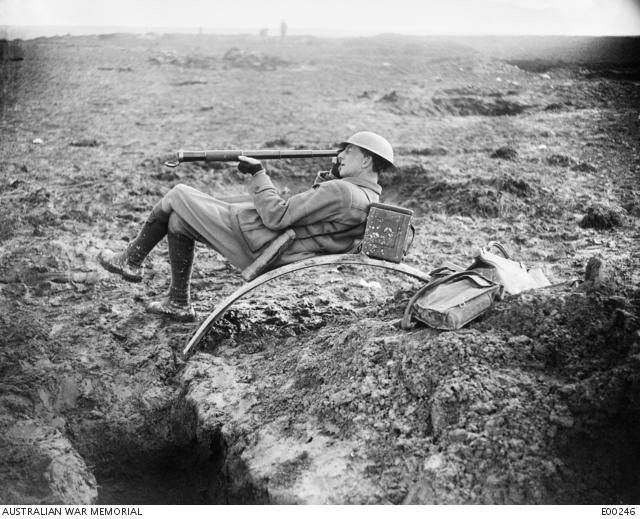
Near Martinpuich, France. Captain C E W Bean, the Australian Official Correspondent, watching the Australian advance through a telescope. Photographer Baldwin, Herbert Frederick, taken on 26 February 1917,
LIFE AS SERVICE.